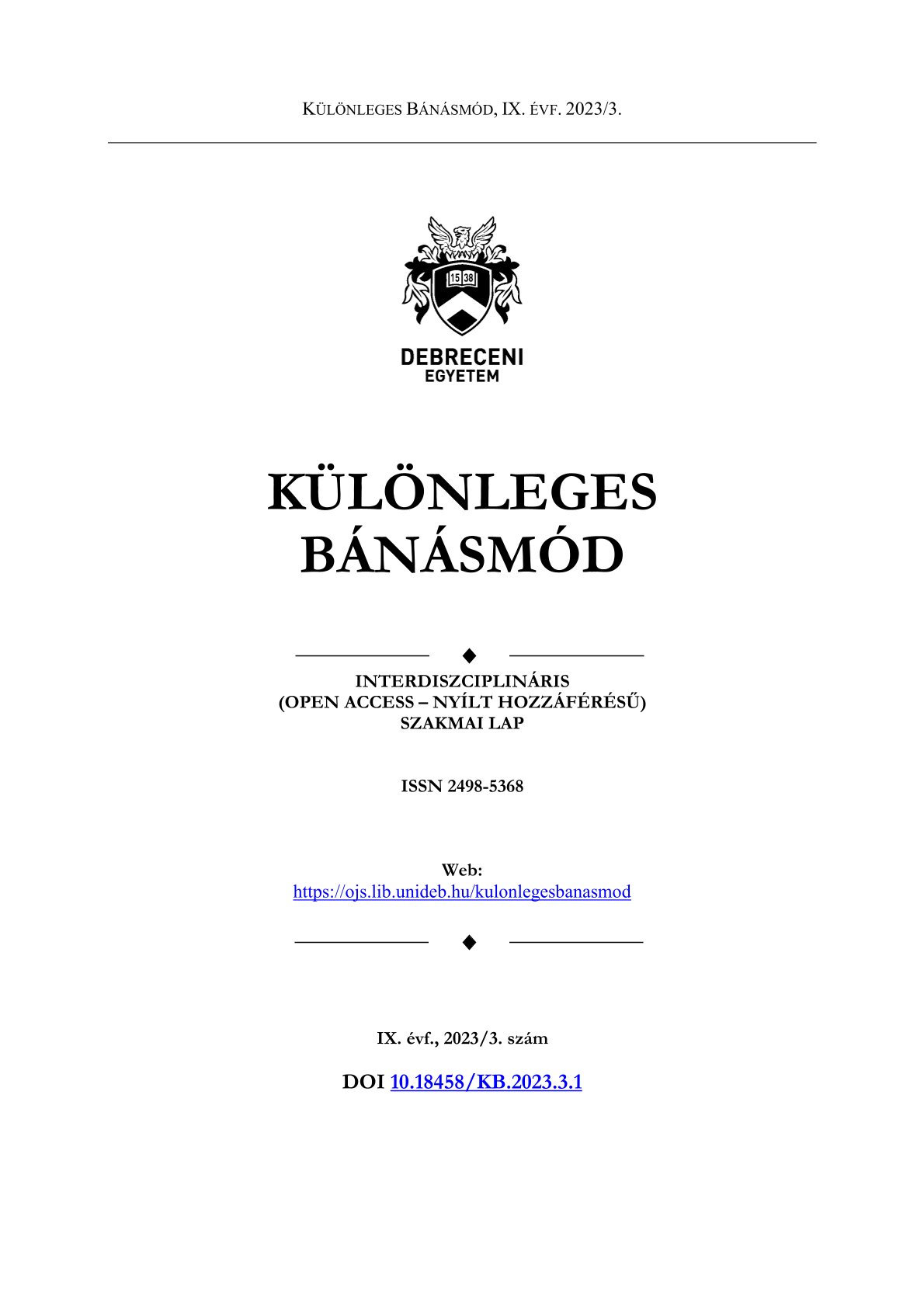A MAGYARORSZÁGON TANULÓ KÜLFÖLDI HALLGATÓK ELVÁRÁSAINAK ÖSSZEHASONLÍTÓ ELEMZÉSE GONDOLATTÉRKÉP SEGÍTSÉGÉVEL: TÚLMUTAT AZ ELVÁRÁSOKON?
Szerzők
Megtekintés
Kulcsszavak
Licenc
Copyright (c) 2023 Miranda HESTI, Dr. Markos Valéria

This work is licensed under a Creative Commons Attribution-NonCommercial-NoDerivatives 4.0 International License.
Hogyan hivatkozzuk
Absztrakt
A hallgatói elvárások az egyik olyan döntő kérdés, amellyel az egyetemnek foglalkoznia kell. A hallgatói elvárások összefüggenek a hallgatók elégedettségével, felsőoktatási elkötelezettségével. A tanulmány kvalitatív kutatást mutat be, különös tekintettel a gondolattérkép elemzésre. A vizsgálati eszköz a hallgatók gondolattérképének két formája volt (a Magyarországra érkezés előtt és után). A vizsgálatban kilenc külföldi hallgató vett részt, akik jelenleg Magyarországon tanulnak. Megállapítást nyert, hogy a nemzetközi hallgatók gondolattérképezése, a gondolattérképezés típusa és a hallgatói elvárások általános gondolat-térképezésének áttekintése hasonlóságokat és különbségeket egyaránt mutatnak.
Hivatkozások
- Ammigan, R., & Drexler, M. L. (2021). Exploring the relationship between academic performance and the international student experience: implications for university support offices and academic units. In Mohamad, M. & Boyd, J. (Eds.). International Student Support and Engagement: Innovative Practices for Universities. Routledge.
- Appleton-Knapp, S. L., & Krentler, K. A. (2006). Measuring student expectations and their effects on satisfaction: The importance of managing student expectations. Journal of Marketing Education, 28(3), 254–264. DOI 10.1177/0273475306293359
- Armstrong, R. W., Mok, C., Go, F. M., & Chan, A. (1997). The importance of cross-cultural expectations in the measurement of service quality perceptions in the hotel industry. International Journal of Hospitality Management, 16(2), 181–190. DOI 10.1016/s0278-4319(97)00004-2
- Badstübner, T., & Ecke, P. (2009). Student expectations, motivations, target language use, and perceived learning progress in a summer study abroad program in Germany. Die Unterrichtspraxis/Teaching German, 42(1), 41–49. DOI 10.1111/j.1756-1221.2009.00034.x
- Bates, E. A., & Kaye, L. K. (2014). “I’d be expecting caviar in lectures”: The impact of the new fee regime on undergraduate students’ expectations of higher education. Higher Education, 67(5), 655–673. DOI 10.1007/s10734-013-9671-3
- Borghi, S., Mainardes, E., & Silva, É. (2016). Expectations of higher education students: A comparison between the perception of student and teachers. Tertiary Education and Management, 22(2), 171–188. DOI 10.1080/13583883.2016.1188326
- Burgess-Allen, J., & Owen-Smith, V. (2010). Using mind mapping techniques for rapid qualitative data analysis in public participation processes. Health Expectations, 13(4), 406–415. DOI 10.1111/j.1369-7625.2010.00594.x
- Darlaston-Jones, D. K., Pike, L., Cohen, L., Young, A. H., Haunold, S., & Drew, N. M. (2003). Are they being served? Student expectations of higher education. Educational Research, 13 (1), 31-52.
- Fearnley, C. J. (2022). Mind mapping in qualitative data analysis: Managing interview data in interdisciplinary and multi-sited research projects. Geo: Geography and Environment, 9(1), 1-19. DOI 10.1002/geo2.109
- Gardiner, S., King, B., & Wilkins, H. (2013). The travel behaviours of international students: Nationality-based constraints and opportunities. Journal of Vacation Marketing, 19(4), 287–299. DOI 10.1177/1356766712471233
- Hassel, S., & Ridout, N. (2018a). An investigation of first-year students’ and lecturers’ expectations of university education. Frontiers in Psychology, 8, 2218. DOI 10.3389/fpsyg.2017.02218
- Işık, M. (2022). Expectations and level of satisfaction of university students from the higher education system. International Journal of Educational Methodology, 8(1), 163–178. DOI 10.12973/IJEM.8.1.163
- Könings, K. D., Brand-Gruwel, S., van Merriënboer, J. J. G., & Broers, N. J. (2008). Does a new learning environment come up to students’ expectations? A longitudinal study. Journal of Educational Psychology, 100(3), 535–548. DOI 10.1037/0022-0663.100.3.535
- Lobo, A., & Gurney, L. (2014). What did they expect? Exploring a link between students’ expectations, attendance and attrition on English language enhancement courses. Journal of Further and Higher Education, 38(5), 730–754. DOI 10.1080/0309877X.2013.817002
- Mammen, J. R., & Mammen, C. R. (2018). Beyond concept analysis: Uses of mind mapping software for visual representation, management, and analysis of diverse digital data. Research in Nursing and Health, 41(6), 583–592. DOI 10.1002/nur.21920
- Mao, Y., Ji, H., & Wang, R. (2022). Expectation and Reality: International students’ motivations and motivational adjustments to sustain academic journey in Chinese universities. Frontiers in Psychology, 13, 833407. DOI 10.3389/fpsyg.2022.833407
- Moraes, D. C.S. B., Montebello, I, M., Zaccaria, B. R., & Cremonezi, G. O. G. (2019). Identification of students’ expectations regarding higher education in the new social context: a meta-analytic study. Brazilian Journal of Marketing, 18(3), 222–245. DOI 10.5585/remark.v18i2.16373
- Paa, H. K., & McWhirter, E. H. (2000). Perceived influences on high school students’ current career expectations. Career Development Quarterly, 49(1), 29–44. DOI 10.1002/j.2161-0045.2000.tb00749.x
- Tempus Public Foundation. (2018). International students in Hungarian higher education institutions. Tempus Public Foundation. www.campusmundi.hu


 https://doi.org/10.18458/KB.2023.3.7
https://doi.org/10.18458/KB.2023.3.7